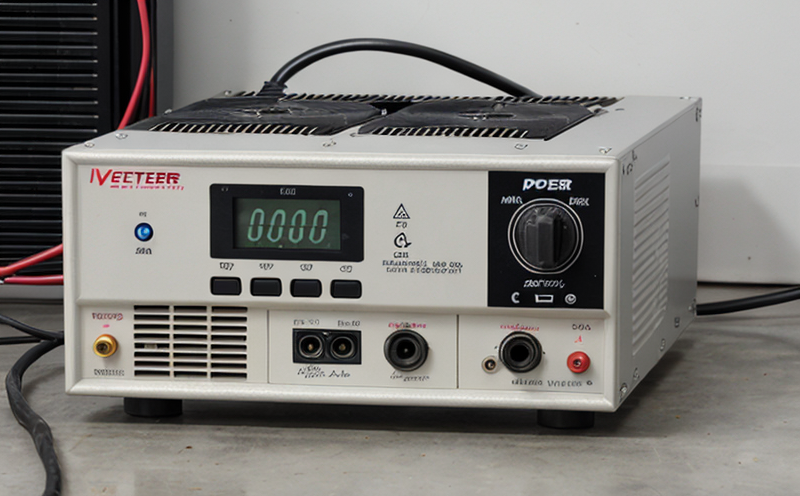IEC 61000-4-5 Surge Immunity Testing of Inverters
The surge immunity testing as per IEC 61000-4-5 is a critical procedure for ensuring the robustness and reliability of inverters used in renewable energy systems. This standard focuses on assessing the ability of electronic equipment, including inverters, to withstand electromagnetic disturbances without suffering damage or performance degradation.
Inverters play a pivotal role in converting direct current (DC) from solar panels or wind turbines into alternating current (AC) suitable for grid supply. Surge immunity testing ensures that these devices can operate reliably under harsh environmental conditions and electrical interference, which is crucial for the sustainability of energy production systems. This test simulates real-world scenarios where transient voltage surges may occur due to lightning strikes, switching transients, or other electromagnetic disturbances.
The IEC 61000-4-5 standard defines a series of tests that are designed to evaluate the immunity of electronic equipment against surge voltages. The testing typically involves applying controlled surge currents and voltage spikes to the inverter under test (IUT) while monitoring its behavior. The goal is to determine whether the IUT can continue operating correctly after exposure to these disturbances.
For inverters, specific considerations include the protection of semiconductor components from potential damage due to overvoltage conditions. Surge immunity testing ensures that inverters maintain their functionality and do not experience permanent failures under such stress conditions. This is particularly important for renewable energy systems where downtime can lead to significant financial losses and disruptions in power supply.
The test setup usually comprises a surge generator capable of producing the required transient voltages, along with appropriate measurement instruments to capture data on the performance of the IUT during testing. Compliance with this standard ensures that inverters meet international quality and safety requirements, thereby enhancing market acceptance and consumer confidence.
Conducting this test early in the development process allows manufacturers to identify potential weaknesses in their designs and implement corrective measures before product release. This not only reduces costs associated with rework but also improves overall product reliability and performance.
In conclusion, IEC 61000-4-5 surge immunity testing is an essential procedure for ensuring the robustness of inverters in renewable energy systems. By adhering to this standard, manufacturers can guarantee that their products will perform reliably under challenging environmental conditions, contributing to the reliability and sustainability of energy production.
Applied Standards
The IEC 61000-4-5 standard is widely recognized for its comprehensive approach to assessing surge immunity in electronic devices. This international standard provides guidelines on how to conduct tests that simulate real-world electromagnetic interference (EMI) conditions, focusing specifically on the effects of transient voltage surges.
The standard specifies various test levels and methodologies for applying controlled surges to the inverter under test (IUT). It covers both the direct current (DC) input side and alternating current (AC) output side of the inverter. The aim is to ensure that the IUT can withstand these surges without suffering damage or performance degradation.
Some key aspects of IEC 61000-4-5 include:
- Identification of appropriate test levels for different types and classes of equipment
- Description of necessary test setups, including the use of surge generators and measurement instruments
- Specification of acceptance criteria for evaluating whether an inverter meets the required standards
The standard also emphasizes the importance of proper specimen preparation before testing. This includes ensuring that all connections are secure and that any external interference sources are minimized to provide accurate test results.
By adhering to IEC 61000-4-5, manufacturers can ensure their inverters meet international quality and safety standards, enhancing market acceptance and consumer confidence in the reliability of renewable energy systems.
Eurolab Advantages
At Eurolab, we pride ourselves on offering comprehensive testing solutions that cater specifically to the needs of the energy sector. Our expertise in IEC 61000-4-5 surge immunity testing ensures that our clients receive accurate and reliable results every time.
- Expertise and Experience: Our team comprises highly skilled engineers with extensive knowledge in renewable energy systems, ensuring thorough and precise testing.
- Precision Instruments: We utilize state-of-the-art equipment to conduct surge immunity tests, guaranteeing accurate measurements and consistent results.
- Comprehensive Reporting: Our detailed reports provide clients with comprehensive insights into the performance of their inverters under various test conditions, facilitating informed decision-making.
- Custom Solutions: We offer tailored testing solutions to meet specific client requirements, ensuring that each project is handled with the utmost attention to detail.
Our commitment to quality and reliability has earned us a reputation as a leading provider of surge immunity testing services in the energy sector. Partnering with Eurolab means gaining access to world-class facilities and experienced professionals who are dedicated to excellence.
Use Cases and Application Examples
- Solar PV Systems: Surge immunity testing is crucial for solar inverters, which convert DC power from photovoltaic modules into AC for grid connection. Ensuring these devices can withstand surges helps prevent costly downtime and ensures continuous operation.
- Wind Turbine Inverters: Wind turbines generate significant amounts of electricity, but the environment is harsh, with frequent exposure to lightning strikes. Testing inverters according to IEC 61000-4-5 guarantees they can operate safely and efficiently in such conditions.
- Battery Energy Storage Systems (BESS): Surge immunity testing ensures that inverters used in BESS installations are robust enough to handle sudden power surges, protecting the entire system from potential damage.
- Microgrids: In microgrid applications where inverters operate independently or in conjunction with conventional grid systems, surge immunity testing is essential for ensuring reliable and safe operation under all conditions.
In each of these scenarios, compliance with IEC 61000-4-5 helps manufacturers produce products that are not only technically superior but also environmentally responsible. Surge immunity testing plays a vital role in enhancing the safety, reliability, and performance of inverters across various applications.





